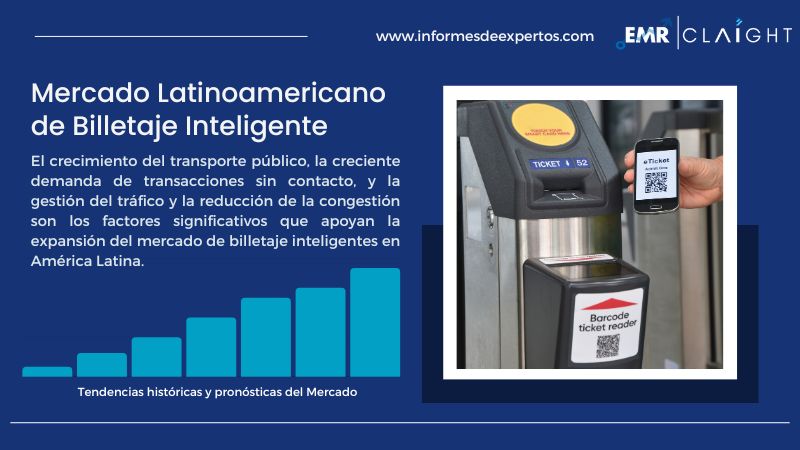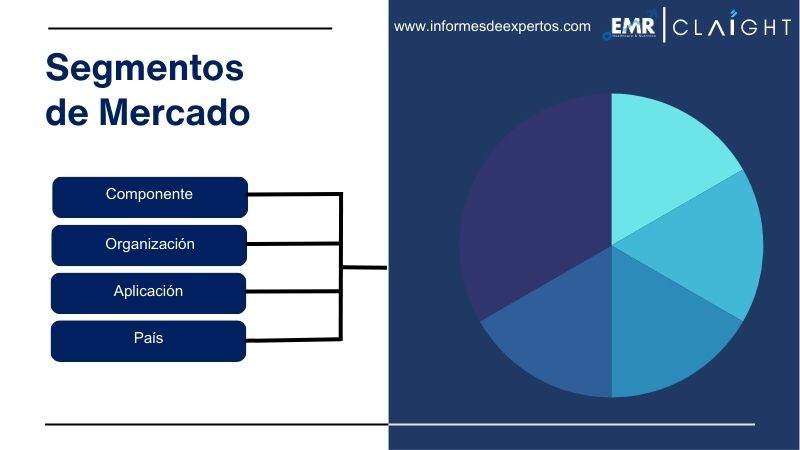Informes

Mercado Latinoamericano de Billetaje Inteligente – Por Componente (Hardware, Software, Servicios); Por Organización (Pequeñas y Medianas Empresas, Grandes Empresas); Por Aplicación (Aparcamiento y Transporte, Deporte y Entretenimiento); Por País (Brasil, México, Argentina, Chile, Otros); Dinámica del Mercado y Panorama Competitivo
Perspectiva del Mercado Latinoamericano de Billetaje Inteligente
El mercado latinoamericano de billetaje inteligente alcanzó un valor de alrededor de USD 2,073.84 millones en 2025. Se prevé que el mercado crezca a una tasa de crecimiento anual compuesta del 16,50% entre 2026 y 2035, para alcanzar un valor de 8,198.01 millones de USD en 2035.
Tamaño del Mercado y Pronóstico:
- Tamaño del Mercado en 2025: USD 2.073,84 millones
- Tamaño del Mercado Proyectado en 2035: USD 8.198,01 millones
- Tasa de Crecimiento Anual Compuesta (CAGR) de 2026 a 2035: 16,5%
El billetaje inteligente está surgiendo como una forma innovadora de reservar billetes. Actúa como un sustituto del sistema tradicional de venta de boletos en papel. Es un sistema que almacena electrónicamente un boleto en un microchip y permite opciones fáciles de transporte y pago a los consumidores. Esta tecnología está evolucionando como una forma rápida, rentable y eficiente que ahorra tiempo y ayuda a los pasajeros a administrar sus viajes de manera conveniente. La implementación de billetaje inteligente no solo se limita a la industria del transporte o el turismo, sino que también está ganando impulso gradualmente en otras industrias, como deportes, entretenimiento, etc.

Informe de muestra gratuito con índice: Obtenga un informe de muestra gratuito con tabla de contenido
La industria de billetaje inteligente en América Latina ha crecido continuamente debido a la creciente demanda de soluciones de billetaje inteligente en la industria de viajes y turismo, así como en las industrias de deportes y entretenimiento. Además, los avances tecnológicos y la aparición de códigos QR, NFC, RFID, códigos de barras, y sistemas de pago abiertos también están revolucionando el crecimiento de la industria, ya que permiten soluciones inteligentes en varias industrias y brindan opciones de pago diversificadas a las personas.
La demanda de billetaje inteligente también está aumentando debido al hecho de que es más eficiente y rentable en comparación con los billetes impresos o en papel y permite a los consumidores evitar largas colas y obtener boletos rápidamente, pagar y descargar inmediatamente de Internet. Se espera que otros factores como la rápida urbanización, la alta demanda de aplicaciones móviles y tarjetas bancarias sin contacto, la creciente popularidad de blockchain en billetaje inteligente creen muchas oportunidades de crecimiento durante el período de pronóstico.
Además, con la llegada de COVID 19 y las restricciones de viaje impuestas a las personas, la industria de viajes y turismo enfrentó un declive. Sin embargo, la pandemia también está acelerando el cambio del efectivo a las opciones digitales. Los pagos sin contacto se están convirtiendo rápidamente en la nueva norma y están desempeñando un papel muy importante, especialmente en las aplicaciones de transporte, para ayudar a proteger a las personas mediante el mantenimiento de protocolos seguros frente al COVID-19. Se espera que esto proporcione un impulso significativo al mercado de billetaje inteligente durante el período de pronóstico.

Informe de muestra gratuito con índice: Obtenga un informe de muestra gratuito con tabla de contenido
El Billetaje Inteligente: Segmentación del Mercado
Sobre la base del componente, el mercado se clasifica en:
- Hardware
- Software
- Servicios
Según el tamaño de la organización, el mercado se segmenta en:
- Pequeñas y Medianas Empresas
- Grandes Empresas
En base a la aplicación, el mercado se divide en:
- Aparcamiento y Transporte
- Deporte y Entretenimiento
Según el país, el mercado latinoamericano de billetaje inteligente se segmenta en:
- Brasil
- México
- Argentina
- Chile
- Otros

Informe de muestra gratuito con índice: Obtenga un informe de muestra gratuito con tabla de contenido
Los crecientes avances tecnológicos y el aumento de las aplicaciones en el transporte público impulsarán el mercado latinoamericano del billetaje inteligente
La creciente demanda de soluciones de venta de billetaje inteligente en diversos sectores, como los viajes y el turismo, los deportes, el ocio y otras industrias, está impulsando el crecimiento del mercado en América Latina. El billetaje inteligente está sustituyendo rápidamente al sistema tradicional de billetes de papel, ya que es más eficiente, rápido y ahorra tiempo de largas colas.
El creciente número de transacciones sin efectivo, los avances tecnológicos y las innovaciones impulsan aún más el crecimiento del mercado. Sin embargo, los elevados costes de instalación y la necesidad de una unidad operativa centralizada para el buen funcionamiento de los sistemas inteligentes de expedición de billetes restringen el crecimiento del mercado.
Actores Clave del Mercado Latinoamericano de Billetaje Inteligente
Los principales actores del mercado son Thales S.A., Infineon Technologies AG, NXP Semiconductors NV, Siemens AG y Hitachi Rail, entre otros.
Las bases de datos incluidas en el informe sobre el mercado latinoamericano de billetaje inteligente proporcionan importantes impactos en el desarrollo presentadas por las principales empresas, teniendo en cuenta sus ingresos. Este informe consta de los valores del período histórico (2019-2025) y del período de pronóstico (2026-2035) con patrones de evaluación ampliados que se llevan a cabo mediante el análisis IDE basado en componente, tamaño de la organización, aplicación y país del mercado para determinar el movimiento del estudio.
Además, el proyecto estudiado y analizado se basa en información detallada sobre el modelo de las cinco fuerzas de Porter, las estrategias de los principales actores existentes y sus carteras con diferenciación beneficiosa en innovación de productos en la industria. Por lo tanto, se concluye que el análisis del poder de negociación de los compradores, el poder adquisitivo de los consumidores, la amenaza de los sustitutos y la nueva entrada con el efecto de la reactivación económica y el desarrollo se evalúa para subrayar el poderoso impacto en el mercado.
Preguntas Clave Respondidas en Este Informe:
- ¿Cuál es el rendimiento actual y la trayectoria proyectada del mercado latinoamericano de billetaje inteligente?
- ¿Cuáles son los principales impulsores, oportunidades y retos para el mercado latinoamericano de billetaje inteligente?
- ¿Cómo afecta cada impulsor, restricción y oportunidad al mercado latinoamericano de billetaje inteligente?
- ¿Cuáles son los principales mercados regionales estudiados en el informe?
- ¿Cuál es la región líder en el mercado latinoamericano de billetaje inteligente?
- ¿Qué factores contribuyen al dominio de esta región en el mercado latinoamericano de billetaje inteligente?
- ¿Cuál es la tasa de crecimiento histórica del mercado latinoamericano de billetaje inteligente en los últimos años?
- ¿Cuáles son sus respectivas fortalezas y enfoques de mercado?
- ¿Cómo contribuyen estas empresas a la dinámica general del mercado latinoamericano de billetaje inteligente?
- ¿Cuál es la estructura competitiva del mercado?
- ¿Quiénes son los principales actores del mercado latinoamericano de billetaje inteligente?
Beneficios Clave para las Partes Interesadas:
- El informe de la industria de IDE ofrece un análisis cuantitativo exhaustivo de varios segmentos del mercado, las tendencias históricas y actuales del mercado, las previsiones del mercado y la dinámica del mercado latinoamericano de billetaje inteligente de 2019 a 2035.
- El informe ofrece los datos más recientes sobre los impulsores, retos y oportunidades del mercado. El informe traza los principales mercados regionales, así como los que registran la tasa de crecimiento más rápida. Además, permite a las partes interesadas identificar los principales mercados nacionales de cada región.
- El análisis de las cinco fuerzas de Porter ayuda a las partes interesadas a evaluar el impacto de los nuevos operadores, la rivalidad competitiva, el poder del proveedor, el poder del comprador y la amenaza de sustitución. Ayuda a las partes interesadas a analizar el nivel de competencia en la industria de latinoamericano de billetaje inteligente y su atractivo.
- El panorama competitivo permite a las partes interesadas comprender su entorno competitivo y ofrece una visión de las posiciones actuales de los principales actores del mercado.
Alcance del Mercado:
|
Características del Informe |
Detalles |
|
Año Base de la Estimación: |
2025 |
|
Datos Históricos: |
2019-2025 |
|
Datos de Pronóstico: |
2026-2035 |
|
Alcance del Informe: |
Tendencias Históricas y Previsiones del Mercado, Impulsores y Limitantes de
|
|
Desglose por Componente: |
|
|
Desglose por |
|
|
Desglose por Aplicación: |
|
|
Desglose por País: |
|
|
Dinámica del Mercado: |
|
|
Panorama Competitivo: |
|
|
Empresas Cubrietas: |
|
*En Informes de Expertos siempre nos esforzamos por brindarle la información más reciente. Los números de artículo son solo indicativos y pueden diferir del informe real.
Language of the Report – English
Sin embargo, el informe puede estar disponible en español por un costo adicional.
1 Preface
2 Report Coverage – Key Segmentation and Scope
3 Report Description
3.1 Market Definition and Outlook
3.2 Properties and Applications
3.3 Market Analysis
3.4 Key Market Players
4 Key Assumptions
5 Executive Summary
5.1 Overview
5.2 Key Drivers
5.3 Key Developments
5.4 Competitive Structure
5.5 Key Industrial Trends
6 Market Snapshot
7 Opportunities and Challenges in the Market
8 Global Smart Ticketing Market Overview
8.1 Key Industry Highlights
8.2 Global Smart Ticketing Historical Market (2019-2025)
8.3 Global Smart Ticketing Market Forecast (2026-2035)
8.4 Global Smart Ticketing Market Share by Region
8.4.1 North America
8.4.2 Europe
8.4.3 Asia Pacific
8.4.4 Latin America
8.4.5 Middle East and Africa
9 Latin America Smart Ticketing Market Overview
9.1 Key Industry Highlights
9.2 Latin America Smart Ticketing Historical Market (2019-2025)
9.3 Latin America Smart Ticketing Market Forecast (2026-2035)
10 Latin America Smart Ticketing Market by Component
10.1 Hardware
10.1.1 Historical Trend (2019-2025)
10.1.2 Forecast Trend (2026-2035)
10.2 Software
10.2.1 Historical Trend (2019-2025)
10.2.2 Forecast Trend (2026-2035)
10.3 Services
10.3.1 Historical Trend (2019-2025)
10.3.2 Forecast Trend (2026-2035)
11 Latin America Smart Ticketing Market by Organization Size
11.1 Small and Medium Enterprises
11.1.1 Historical Trend (2019-2025)
11.1.2 Forecast Trend (2026-2035)
11.2 Large Enterprises
11.2.1 Historical Trend (2019-2025)
11.2.2 Forecast Trend (2026-2035)
12 Latin America Smart Ticketing Market by Application
12.1 Parking and Transportation
12.1.1 Historical Trend (2019-2025)
12.1.2 Forecast Trend (2026-2035)
12.2 Sports and Entertainment
12.2.1 Historical Trend (2019-2025)
12.2.2 Forecast Trend (2026-2035)
13 Latin America Smart Ticketing Market by Country
13.1 Brazil
13.1.1 Historical Trend (2019-2025)
13.1.2 Forecast Trend (2026-2035)
13.2 Mexico
13.2.1 Historical Trend (2019-2025)
13.2.2 Forecast Trend (2026-2035)
13.3 Argentina
13.3.1 Historical Trend (2019-2025)
13.3.2 Forecast Trend (2026-2035)
13.4 Chile
13.4.1 Historical Trend (2019-2025)
13.4.2 Forecast Trend (2026-2035)
13.5 Others
14 Market Dynamics
14.1 SWOT Analysis
14.1.1 Strengths
14.1.2 Weaknesses
14.1.3 Opportunities
14.1.4 Threats
14.2 Porter’s Five Forces Analysis
14.2.1 Supplier’s Power
14.2.2 Buyers Powers
14.2.3 Threat of New Entrants
14.2.4 Degree of Rivalry
14.2.5 Threat of Substitutes
14.3 Key Indicators for Demand
14.4 Key Indicators for Price
15 Competitive Landscape
15.1 Market Structure
15.2 Company Profiles
15.2.1 Thales S.A.
15.2.1.1 Company Overview
15.2.1.2 Product Portfolio
15.2.1.3 Demographic Reach and Achievements
15.2.1.4 Certifications
15.2.2 Infineon Technologies AG
15.2.2.1 Company Overview
15.2.2.2 Product Portfolio
15.2.2.3 Demographic Reach and Achievements
15.2.2.4 Certifications
15.2.3 NXP Semiconductors NV
15.2.3.1 Company Overview
15.2.3.2 Product Portfolio
15.2.3.3 Demographic Reach and Achievements
15.2.3.4 Certifications
15.2.4 Siemens AG
15.2.4.1 Company Overview
15.2.4.2 Product Portfolio
15.2.4.3 Demographic Reach and Achievements
15.2.4.4 Certifications
15.2.5 Hitachi Rail
15.2.5.1 Company Overview
15.2.5.2 Product Portfolio
15.2.5.3 Demographic Reach and Achievements
15.2.5.4 Certifications
15.2.6 Others
16 Key Trends and Developments in the Market
List of Key Figures and Tables
1. Global Smart Ticketing Market: Key Industry Highlights, 2019 and 2035
2. Latin America Smart Ticketing Market: Key Industry Highlights, 2019 and 2035
3. Latin America Smart Ticketing Historical Market: Breakup by Component (USD Million), 2019-2025
4. Latin America Smart Ticketing Market Forecast: Breakup by Component (USD Million), 2026-2035
5. Latin America Smart Ticketing Historical Market: Breakup by Organization Size (USD Million), 2019-2025
6. Latin America Smart Ticketing Market Forecast: Breakup by Organization Size (USD Million), 2026-2035
7. Latin America Smart Ticketing Historical Market: Breakup by Application (USD Million), 2019-2025
8. Latin America Smart Ticketing Market Forecast: Breakup by Application (USD Million), 2026-2035
9. Latin America Smart Ticketing Historical Market: Breakup by Country (USD Million), 2019-2025
10. Latin America Smart Ticketing Market Forecast: Breakup by Country (USD Million), 2026-2035
11. Latin America Smart Ticketing Market Structure
*The list of players in the competitive landscape section can be customised or made more exhaustive based on your specific requirements.*
¿Cuál fue el tamaño del mercado del billetaje inteligente en América Latina en 2025?
En 2025, el mercado objetivo alcanzó un valor de USD 2.073,84 millones.
¿Cuál es la tasa de crecimiento del mercado?
Se prevé que el mercado de boletaje inteligente de América Latina crezca a una CAGR del 16,50% entre 2026 y 2035.
¿Cuál es la perspectiva de pronóstico del mercado de billetaje inteligente de América Latina para 2026-2035?
Se estima que el mercado experimentará un crecimiento saludable en el período de pronóstico de 2026-2035 para alcanzar USD 8.198,01 millones en 2035.
¿Cuáles son los factores significativos que apoyan la expansión del mercado?
El crecimiento del transporte público, la creciente demanda de transacciones sin contacto, y la gestión del tráfico y la reducción de la congestión son los factores significativos que apoyan la expansión del mercado de billetaje inteligentes en América Latina.
¿Cuáles son las tendencias clave en el mercado del billetaje inteligente en América Latina?
La integración de la movilidad como servicio (MaaS) y la creciente adopción de open loop payment systems son las tendencias clave en el mercado objetivo.
¿Cuáles son los principales países cubiertos en el informe sobre el mercado de billetaje inteligente en América Latina?
Los principales países latinoamericanos cubiertos en el informe de mercado son Brasil, México, Argentina y Chile, entre otros.
¿Cuál es la segmentación del mercado en función del componente?
En función del componente, el mercado se divide en hardware, software y servicio.
¿Cómo se segrega el mercado de billetaje inteligente en América Latina según el tamaño de organización?
Según el tamaño de organización, el mercado se segrega en grandes empresas, pequeñas y medianas empresas.
¿Cuáles son las distintas aplicaciones del billetaje inteligente?
Las distintas aplicaciones del billetaje inteligente son el aparcamiento, el transporte, los deportes y el entretenimiento.
¿Quiénes son los principales actores del mercado latinoamericano de billetaje inteligente?
Los principales actores del mercado son Thales S.A., Infineon Technologies AG, NXP Semiconductors NV, Siemens AG y Hitachi Rail, entre otros.
Excel Data Set
USD1799
-
Datos completos en formato Excel para un usuario
-
Impresión no permitida
-
Entrega por Email
-
Personalización limitada gratuita (pre-venta)Soporte de analista post ventaDescuento del 50% en la Próxima ActualizaciónUsuario Único
USD3199
USD2999-
Restringido a un usuario
-
Solo una impresión
-
Disponible en PDF
-
Personalización limitada gratuita (pre-venta)Soporte de analista post ventaDescuento del 50% en la Próxima ActualizaciónCinco Usuarios
USD4199
USD3999-
Restringido a cinco usuarios
-
Una impresión por usuario
-
Disponible en PDF
-
Personalización limitada gratuita (pre-venta)
-
Soporte de analista post venta
-
Descuento del 50% en la Próxima Actualización
Multiusuario
USD5199
USD4999-
Usuarios ilimitados dentro de la organización
-
Impresiones ilimitadas
-
Disponible en PDF
-
Personalización limitada gratuita (pre-venta)
-
Soporte de analista post venta
-
Descuento del 50% en la Próxima Actualización
Póngase en Contacto¿Cualquier Pregunta? Hable con un Analista
Solicitar una MuestraVer una Muestra
Solicitar PersonalizaciónSe le olvidó algo? Pregunte Ahora
¿Por qué Informes de Expertos?La Gente Adecuada
Somos técnicamente excelentes, estratégicos, prácticos, experimentados y eficientes; nuestros analistas son cuidadosamente seleccionados en función de tener los atributos correctos para trabajar con éxito y ejecutar proyectos basados en sus expectativas.
Metodología Correcta
Aprovechamos nuestra tecnología de vanguardia, nuestro acceso a bases de datos confiables y nuestro conocimiento de los modelos actuales utilizados en el mercado para ofrecerle soluciones de investigación que se adapten a sus necesidades y lo pongan a la vanguardia.
Precio Justo
Realizamos una investigación exhaustiva y de calidad superior a precios razonables, inigualables y que demuestran nuestra comprensión de su estructura de recursos. Además, ofrecemos descuentos atractivos en nuestros próximos informes.
Apoyo Adecuado
Nuestro equipo de analistas expertos está a su disposición entera para ofrecerle resultados óptimos personalizados para satisfacer sus necesidades precisas dentro del plazo especificado y ayudarlo a comprender mejor la industria.
Informes SimilaresEl tamaño del mercado de nano y microsatélites se valoró en USD 4.398,24 millones en 2025. Se proyecta que el mercado se expanda a una CAGR del 18% durante el período de pronóstico de 2026 a 2035...
El mercado de realidad virtual en Brasil se valoró en USD 2,68 mil millones en 2025. Se espera que el mercado crezca a una CAGR del 18,99% durante el período de pronóstico de 2026-2035 para alcanza...
El tamaño del mercado de ciudades inteligentes en Brasil alcanzó un valor aproximado de 8,51 mil millones de USD en 2025. Se prevé que el mercado crezca a una tasa de crecimiento anual compuesta de...
El mercado de relojes inteligentes alcanzó USD 50,38 mil millones en 2025 y crecerá a una CAGR del 15,60% hasta USD 214,70 mil millones en 2035.
El mercado de relojes inteligentes en América Latina creció notablemente en 2025. Se espera que el mercado crezca a una tasa de crecimiento anual compuesta del 11,90% durante 2026-2035.
Newsletter





